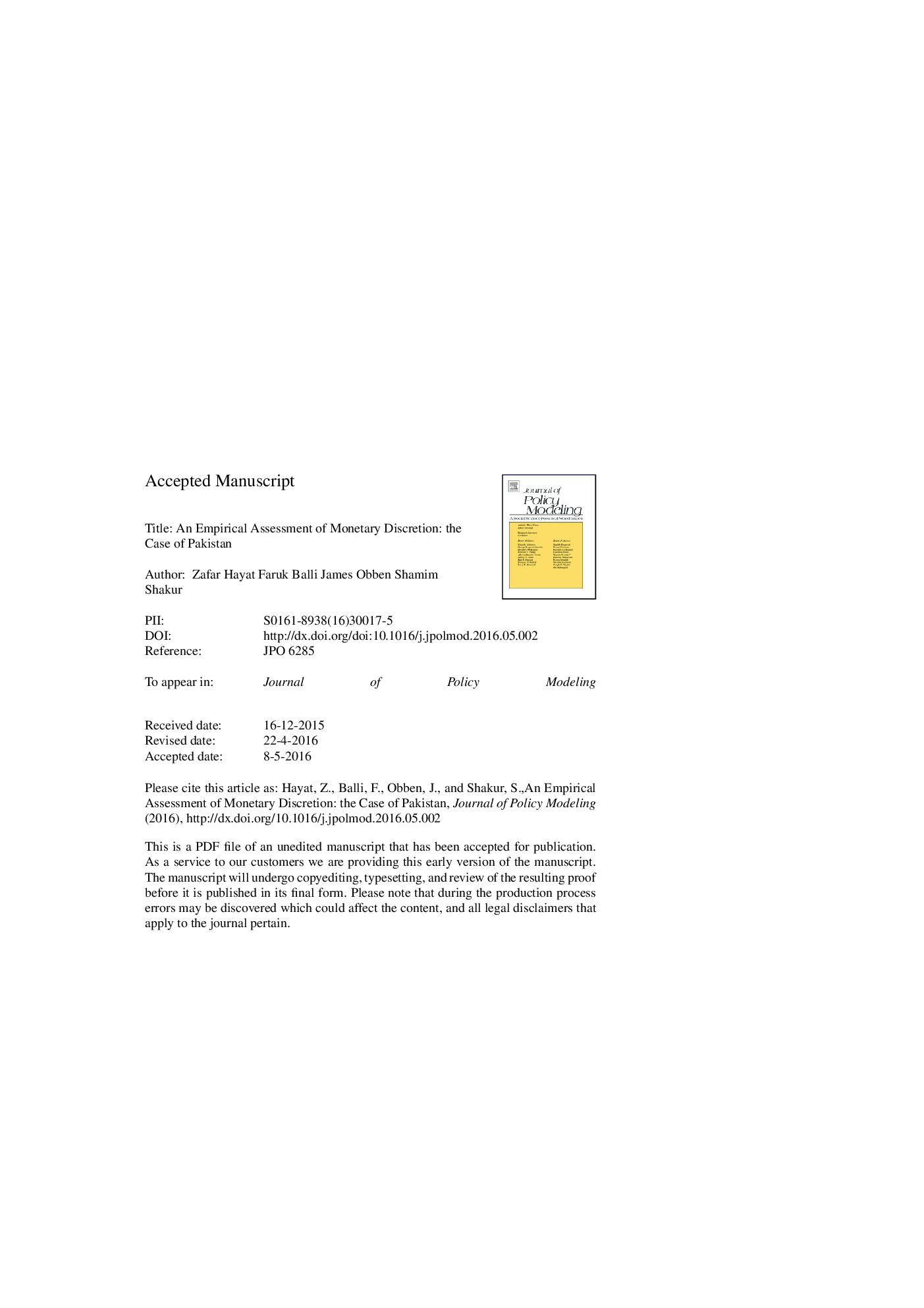| کد مقاله | کد نشریه | سال انتشار | مقاله انگلیسی | نسخه تمام متن |
|---|---|---|---|---|
| 5101714 | 1377317 | 2016 | 26 صفحه PDF | دانلود رایگان |
عنوان انگلیسی مقاله ISI
An empirical assessment of monetary discretion: The case of Pakistan
ترجمه فارسی عنوان
ارزیابی تجربی از اختیارات پولی: مورد پاکستان
دانلود مقاله + سفارش ترجمه
دانلود مقاله ISI انگلیسی
رایگان برای ایرانیان
کلمات کلیدی
ترجمه چکیده
این مقاله به طور تجربی به بررسی اینکه میزان اختیار پولی موجب افزایش تورم بیش از حد شده است، بدون مقایسۀ رشد واقعی رشد در کوتاه مدت و کوتاه مدت، به صورت مستقیم یا غیرمستقیم بررسی می شود. اول، یک چارچوب برای اندازه گیری اختیار پولی و رفتارهای مربوط به آن در تورم و رشد ایجاد شده است. دوم، با استفاده از پرونده پاکستان، که نمونه ای از یک سیاست استراتژیک سیاست پولی اختیاری است، نه تنها اثرات مستقیم و بلند مدت اختیارات پولی بر تورم و رشد واقعی، بلکه اثرات غیر مستقیم آن بر تورم نیز به اثبات رسیده است. در بلندمدت، اختیار پولی به طور قابل توجهی در مقابل تورم بی اعتبار است و بدون ایجاد رشد واقعی رشد نمی کند و هیچ گونه اختلاف بین تورم ناشی از اختیار و رشد واقعی وجود ندارد. تاثیر مستقیم کوتاه مدت اختیارات پولی بر تورم و رشد واقعی مخلوط - هر دو مثبت و منفی - با تأخیرهای متفاوت؛ با این وجود سود حاصل از اختیار پولی بیش از ضررهای ناشی از آن نیست. علاوه بر این، تاثیر غیرمستقیم اختیار پولی از طریق تورم بر رشد واقعی به طور قابل توجهی منفی است. در تعادل، هیچ چیز از اختیار پولی به دست نمی آید و بنابراین اثر سیاست استفاده از آن برای افزایش رشد احتمالی در هزینه ثبات قیمت، بازاندیشی را به دنبال دارد.
موضوعات مرتبط
علوم انسانی و اجتماعی
اقتصاد، اقتصادسنجی و امور مالی
اقتصاد و اقتصادسنجی
چکیده انگلیسی
This paper empirically examines the extent to which monetary discretion induces excess inflation without offsetting real growth gains in the long and short runs both directly and indirectly. First, a framework is developed to quantify monetary discretion and the corresponding behaviors it causes in inflation and growth. Second, using Pakistan's case, which is an example of a typical discretionary monetary policy strategy, not only the direct long and short-term effects of monetary discretion on inflation and real growth but its indirect effects on the latter via inflation are ascertained. In the long run monetary discretion is significantly biased against inflation without creating real growth gains and there is no trade-off between discretion-induced inflation and real growth. The short-term direct impact of monetary discretion on inflation and real growth is mixed-both positive and negative-with varying lags; however, the gains induced by monetary discretion do not outweigh the losses it induced. Moreover, the indirect impact of monetary discretion via inflation on real growth is significantly adverse. On balance, there is nothing to gain from monetary discretion and therefore the efficacy of the policy of its active use for possible growth gains at the expense of price stability warrants re-thinking.
ناشر
Database: Elsevier - ScienceDirect (ساینس دایرکت)
Journal: Journal of Policy Modeling - Volume 38, Issue 5, SeptemberâOctober 2016, Pages 954-970
Journal: Journal of Policy Modeling - Volume 38, Issue 5, SeptemberâOctober 2016, Pages 954-970
نویسندگان
Zafar Hayat, Faruk Balli, James Obben, Shamim Shakur,
